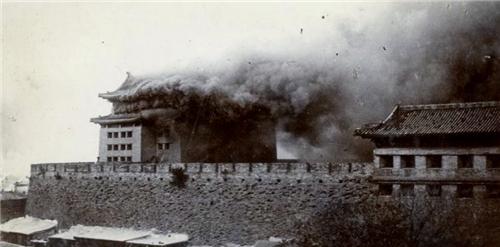After the change of law, Empress Dowager Cixi planned to depose the Guangxu Emperor, but was opposed by the foreigners, and although Cixi hated the foreigners, she was powerless to oppose them, and the purpose of the foreigners was also "the heart of Sima Zhao, known to everyone", and it happened that the Boxers were using the slogan of "helping the Qing and destroying the yangs", so Cixi used the Boxers.

Although the Boxers had neither advanced weapons nor military ideas, although they had invaded the Tianjin Concession, they were really fighting against the artillery fire of the foreigners, and it was only a strange thing not to lose the battle, and although the Qing army had modern weapons and equipment, the command system and so on were still stuck in the era of cold weapons, even if there were more troops, in the end it was self-defeating.
In 1900, the British Empire, the United States of America, the French Third Republic, the German Empire, the Russian Empire, the Great Japanese Empire, the Italian Empire, the Austro-Hungarian Empire and other eight-nation alliance invaded on the grounds of suppressing the Boxers, cixi fled west, and put all the responsibility on the Boxers.
Led by british admiral Seymour in the early period, the Eight-Power Alliance initially had a total strength of about 30,000 troops, and later increased to about 50,000 people, of which Japan sent the largest number of troops, Italy symbolically sent 80 people, while the Qing army had 80,000 people, and the Boxers were about 100,000 to 300,000 people.
The final result was that Li Hongzhang and others signed the Treaty of Xinugu on behalf of the Qing government, which is considered to be the most unequal treaty in China's modern history, but Empress Dowager Cixi returned to the Forbidden City and continued to live a luxurious life.
At the end of the Qing Dynasty, large and small unequal treaties, the Qing government signed a lot, a total of 1.32 billion silver to the powers, without adding interest, the number is also surprising, equivalent to 11 times the state revenue in 1901.
After the Xinhai Revolution, the Qing Dynasty came to an end in 1912, and the history of China's feudal dynasty came to an end.
In fact, after the outbreak of the Wuchang Uprising, the Western powers were worried that after the end of the Qing Dynasty, our country would "pay the bills", so they plotted to interfere in internal affairs, and even planned to launch armed forces to eliminate the revolutionary armed forces in various places, which dr. Sun Yat-sen was also clear, so in order to eliminate the worries of the great powers, in the "Letter of the Great President to Friends", he said that the Republic of China would fulfill its obligation of compensation without discount.
Even though Yuan Shikai later stole the fruits of the revolution's victory, he still undertook the obligation of compensation, and with the rise of China's strength, in order to establish a good image, the United States first proposed to refund half of the "Gengzi indemnity" for the study expenses of Chinese students studying in the United States.
Relevant data show that from 1908 to 1946, the United States returned a total of $34.93 million, accounting for about 63% of the total compensation it received.
After the United States, Britain, France, Russia and other countries also took the initiative to propose that China postpone the payment of reparations for 10 years, with the change of the international situation, at the end of World War I, the Soviet Regime announced that it would give up all the privileges of Tsarist Russia in our country, including reparations and other issues, in May 1924, the two countries signed the Sino-Russian Agreement.
In addition, we participated in the First World War as a member of the Allies, and according to article 128 of the Treaty of Versailles, Germany renounced its reparations after 14 March 1917, and after the dissolution of the Austro-Hungarian Empire, it also renounced the matter of our reparations.
However, Although Japan's "wolf ambitions" have changed with the times, the eight Western powers no longer care about the matter of reparations, but Japan has not given up its invasion of our country, even if it joined the activities of the great powers to refund the reparations, but it is under the guise of "cultural undertakings" that the refunds are used to spy on China's intelligence, cultivate traitors, co-opt warlords to fight civil wars, and invade China.
It was not until 1939, the third year after the outbreak of the All-Out War of Resistance, that the Republic of China government officially stopped paying reparations to Japan.